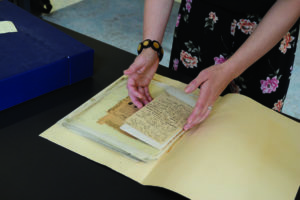
Abigail Glogower handles a letter from Isaac W. Bernheim in the new Jewish Community Archive at the Filson Historical Society. (photo by Jamie Evans)
Abigail Glogower opened a folder with the name “David Armstrong” typed on the edge.
She then carefully removed a handwritten letter from the late Louisville mayor and one-time prosecutor to his friend, Fred Joseph, describing a night in Leningrad when he and other attorneys visiting Russian capital slipped away from their handlers for a covert meeting Jewish refuseniks.
The folder contained other papers related to that encounter, including stories later published in Community.
“This is the first thing I ever cataloged here,” said Glogower, curator of the fledgling Jewish Community Archive at the Filson Historical Society.
But it won’t be her last.
Glogower, who started at the Filson in 2017, took Community on a tour of the archive, which she hopes will stoke new interest in Louisville history as something that was made by more than just “white Protestant men in the 1800s.”
In fact, she has already begun displaying artifacts from the archive in an exhibit in the main museum titled “Connecting the Dots: Exploring Your Family History,” which opened August 31. That exhibit includes photos from the Helman family, among the founders of Four Courts-Louisville Hebrew Home, including an oil painting of Carl K. Helman.
Glogower hopes exhibits such as these will spur interest in Jewish genealogical research at the Filson.
Another exhibit in the carriage house shows parts of the wardrobe of activist Geneva H. Bell, whose husband, Dr. Jesse Bell, was the first black physician at Jewish Hospital.
Composed several cubic feet of boxes and folders filled with papers, albums, photos, programs, records and other curated items, the Jewish archive is preserved, not just one shelf or stack, but throughout the Old Louisville-based museum. An elaborate cataloging system is all that ties it together.
“Since my arrival, we have brought in half a dozen new collections related to the Jewish history of Louisville ranging in size from a single letter … to 13 cubic feet (Jewish Hospital records).” Glogower said. “I am also in the process of acquiring several more collections as we speak, but we don’t like to count our chicks before they hatch.”
Among other examples of papers in the collection are the correspondence to and from Isaac W. Bernheim, including letters to a New York rabbi on the subject of Zionism.
“It really seems, until his dying day, he was not on board with Zionism,” Glogower said of Bernheim. “He really believed that Jews need to be fully integrated and participating citizens in their own countries.”
Just as interesting were the papers of Rabbi Martin Perley, a former Army chaplain and spiritual leader of Brith Shalom who left the congregation in the 1960s to become director of the Jefferson County Human Relations Commission.
Many of Perley’s papers deal with ministering to ex-Jewish G.I.s and POWs, but one disturbing folder is a collection of hate mail he received – and saved – while running the commission. He even kept the envelopes, including one addressed to him in scrawling caps, using vicious language to describe the rabbi.
The letters are “hateful and vile,” Glogower said, but every so often, she noted, one poses a “thought-provoking question.” One writer, for instance, asked the rabbi why the Jewish community was moving from predominantly black city neighborhoods to predominantly white suburbs.
Glogower sees the archive as a way that shows how Jewish Louisville has intersected with the broader community over the years, with each influencing and being influenced by the other.
“I get excited about points of overlap between the Jewish community and the larger Louisville community,” she said. We don’t exist in a vacuum.”
Want to go?
The Filson Historical Society is located at 1310 S. 3rd St. and is open for research Monday to Friday, 9 a.m. to 5 p.m. There is a $10 daily research fee for nonmembers. Glogower can be reached at 502-635-5083 x214 or at
abbyglogower@filsonhistorical.org.
To learn of upcoming exhibits, visit filsonhistorical.org.


